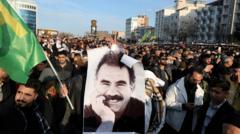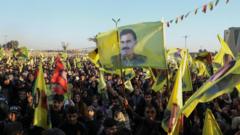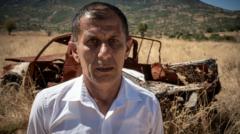The outlawed Kurdish Workers' Party (PKK), engaged in a decades-long insurgency against Turkey, has declared it will lay down arms and disband following a significant call from its imprisoned leader, Abdullah Ocalan. This decision comes as both the PKK and the Turkish government find themselves at a crossroads, reshaping the political landscape in Turkey.
Kurdish PKK Declares Disbandment and Lays Down Arms Amid New Political Landscape

Kurdish PKK Declares Disbandment and Lays Down Arms Amid New Political Landscape
PKK's announcement marks a potential turning point in the long-standing conflict between Turkey and its Kurdish population, seeking to redefine their political aspirations.
The PKK, classified as a terrorist organization by Turkey, the European Union, the United Kingdom, and the United States, has been involved in a violent struggle for Kurdish autonomy, resulting in over 40,000 deaths since 1984. Originally demanding an independent Kurdish state, the group has shifted its focus towards advocating for greater autonomy and rights for the Kurdish people, who comprise about 20% of Turkey's population.
In February, Ocalan, who has been imprisoned since 1999, urged the group to dissolve in a letter that emphasized the necessity of democratic means for achieving political goals. The implications of this disbandment remain uncertain, yet there is speculation about potential negotiations that may grant Ocalan some form of parole. Kurdish political leaders are hopeful that this could lead to renewed dialogue for enhanced rights.
The factors prompting this decision include the PKK's significant decline in military strength due to increased pressure from Turkish forces, alongside current political maneuvering ahead of the 2028 presidential elections. Turkish President Recep Tayyip Erdogan may require the support of pro-Kurdish political factions to consolidate his hold on power.
A spokesperson from Erdogan's ruling AK Party described the disbandment as a crucial step toward a "terror-free Turkey," adding that the process would be monitored by state institutions. Winthrop Rodgers from Chatham House noted that while there have been signs of goodwill from certain Turkish leaders, the extent to which this may translate into meaningful democratic changes for Kurdish representation remains uncertain. "The responsibility now lies with Turkey," he remarked.
This development opens up a complex dialogue around the future of Kurdish rights in Turkey, as advocates call for systemic changes to support full Kurdish participation in both politics and society.
In February, Ocalan, who has been imprisoned since 1999, urged the group to dissolve in a letter that emphasized the necessity of democratic means for achieving political goals. The implications of this disbandment remain uncertain, yet there is speculation about potential negotiations that may grant Ocalan some form of parole. Kurdish political leaders are hopeful that this could lead to renewed dialogue for enhanced rights.
The factors prompting this decision include the PKK's significant decline in military strength due to increased pressure from Turkish forces, alongside current political maneuvering ahead of the 2028 presidential elections. Turkish President Recep Tayyip Erdogan may require the support of pro-Kurdish political factions to consolidate his hold on power.
A spokesperson from Erdogan's ruling AK Party described the disbandment as a crucial step toward a "terror-free Turkey," adding that the process would be monitored by state institutions. Winthrop Rodgers from Chatham House noted that while there have been signs of goodwill from certain Turkish leaders, the extent to which this may translate into meaningful democratic changes for Kurdish representation remains uncertain. "The responsibility now lies with Turkey," he remarked.
This development opens up a complex dialogue around the future of Kurdish rights in Turkey, as advocates call for systemic changes to support full Kurdish participation in both politics and society.


















